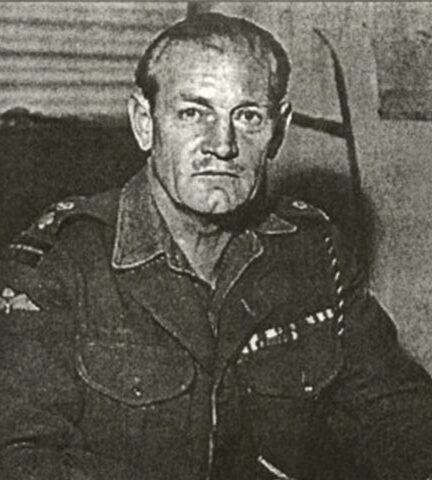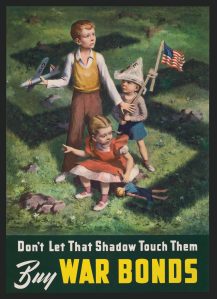In modern warfare with rifles, machine guns, grenades, and artillery the man who shows up with a broadsword and a bow and arrows would likely be deemed crazy. And perhaps that is how John Malcolm Fleming Thorpe Churchill came to be known as “Mad Jack.”
In September 1939, as the Germans made a lemming-like rush towards the Polish border, a 43-year-old Churchill, a former graduate of the Royal Military College, Sandhurst, rejoined his old Manchester Regiment after his initial retirement in 1936.
After a decade of service Churchill once again found himself in the thick of it. As the British Expeditionary Force conducted what Prime Minister Winston Churchill dubbed a “fighting retreat” during the Battle of France, the other Churchill—no familial relation to the PM—was aggressive, refusing to give a yard of ground without exacting a heavy toll on the Germans. Churchill’s preferred method was to terrorize the enemy—conducting ambushes and raids on the advancing Blitzkrieg, all the while adorned with his sword and bow.
Amid the heavy fighting the brazen officer quipped “Any officer who goes into action without his sword is improperly dressed”—which may or may not be the most British sentence to have ever been uttered.
While fighting near the French village of l’Epinette, roughly 84 miles northeast of Lyon, Churchill became aware of an advancing German patrol. As the small group approached a hill overlooking the village, one German silently fell over, dead. Moments later the confused Germans were cut down by rifle fire. But the first German had not been felled by a gunshot wound. Churchill had killed the first with an expert shot from his bow and arrow—the only known long bow kill of the war.
Despite their best efforts to resist the company was cut off. Churchill, despite being wounded, then exfiltrated the remnants of his company through German lines at night and returned to their brigade lines. Churchill was awarded the Military Cross for his actions.
After being evacuated to England Churchill joined the Commandos where he was made second-in-command of No. 3 Commando. With this unit he participated in a daring raid, ironically named Operation Archery, against the German garrison at Vågsøy, Norway in December 1941. In what would become characteristic, Churchill disembarked from the landing craft dressed in a kilt and playing his bagpipes to the tune of March of the Cameron Men, before drawing his sword and leading his men in the capture of several shore batteries.
Churchill received a bar to his Military Cross for his actions in Norway.
Promoted to command No. 2 Commando after Norway, Churchill was then sent to the Mediterranean to take part in the invasions of Sicily and Salerno.
At Salerno Churchill personally captured 42 German prisoners, along with all their weapons, with nothing but his sword and the help of a corporal.
Churchill continued to rack up an impressive service record, receiving a bar to his Distinguished Service Order for leading his men against the German forces at Piegoletti, during which time they effectively fought as line infantry and took out this crucial strongpoint, capturing 136 prisoners, and contributing tremendously to saving the Salerno beachhead.
Churchill’s next assignment was leading a detachment consisting of multiple Commandos, along with Tito’s Yugoslav partisans against the Germans in the Adriatic. After numerous successful raids and operations in May of 1944 Churchill and his men were ordered to capture the island of Brac from the Germans.
Arrayed against wired, mined, and fortified positions the Commandos charged forward and captured the German position at Point 622—however, they endured heavy casualties and a German counterattack drove the Commandos from the hill.
Churchill led the next attack himself taking the hill with only six other Commandos, three of whom were wounded. When a German mortar shell killed or wounded the remaining Commandos Churchill took to his pipes, playing Will Ye No Come Back Again until he too was knocked out by German grenades and captured.
Churchill avoided execution by Hitler’s infamous “Commando Order” thanks to a merciful German officer. “People are less likely to shoot at you if you are smiling at them,” Churchill later joked.
Transferred to the Sachsenhausen concentration camp just north of Berlin, Churchill and another RAF officer managed to tunnel out and escape in September of 1944 but were recaptured just short of the Baltic Coast.
Moved to a more secure camp in Niederdorf, Austria, in April 1945 an undeterred Churchill took advantage of the camp’s failed lighting system one evening, slipping away into the forest and heading towards the Alps. This time he was successful.
Eight days later, after train hopping towards the Brenner Pass, Churchill was found alone, hobbling along on a sprained ankle, by an American reconnaissance unit.
And while the war in Europe was drawing to a close, a repatriated Churchill was still looking for action. As the fighting in the Pacific was still raging, he was sent to join a unit in Burma. However, before he managed to get there the war had ended. Churchill expressed his disappointment to a friend, “You know, if it hadn’t been for those damned Yanks we could have kept the war going for another ten years.”
Churchill retired from the military in 1959. He died in 1996 at the age of 89.





